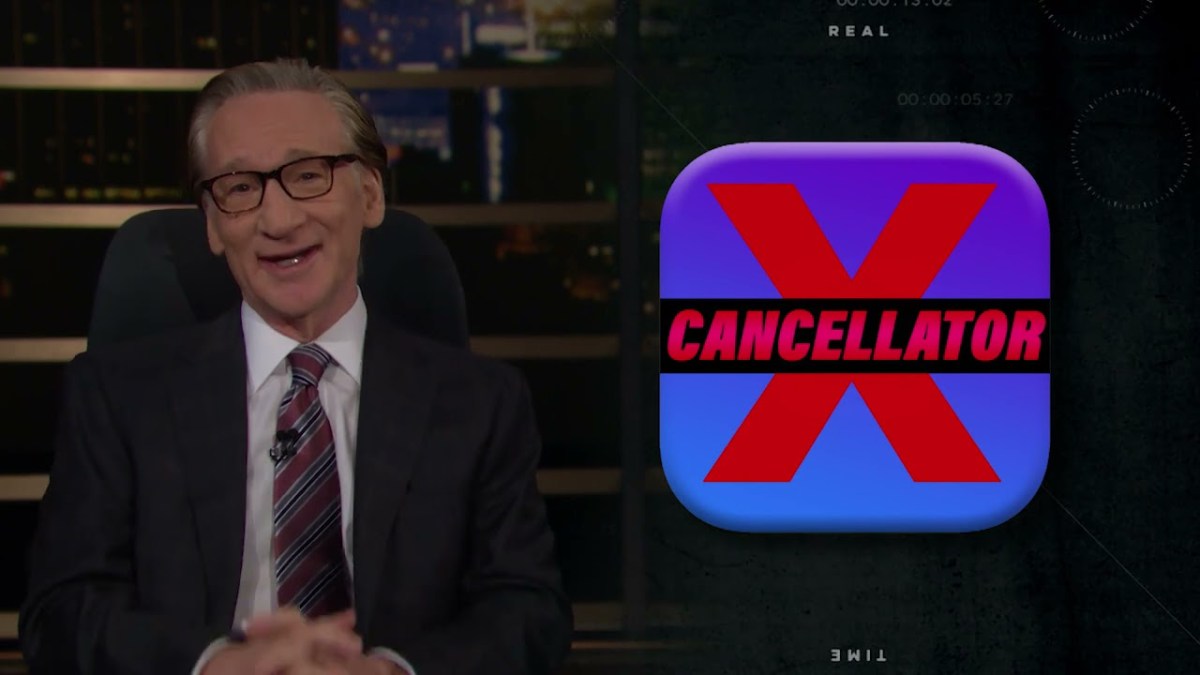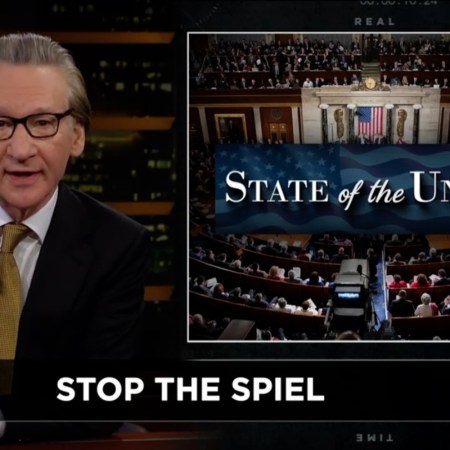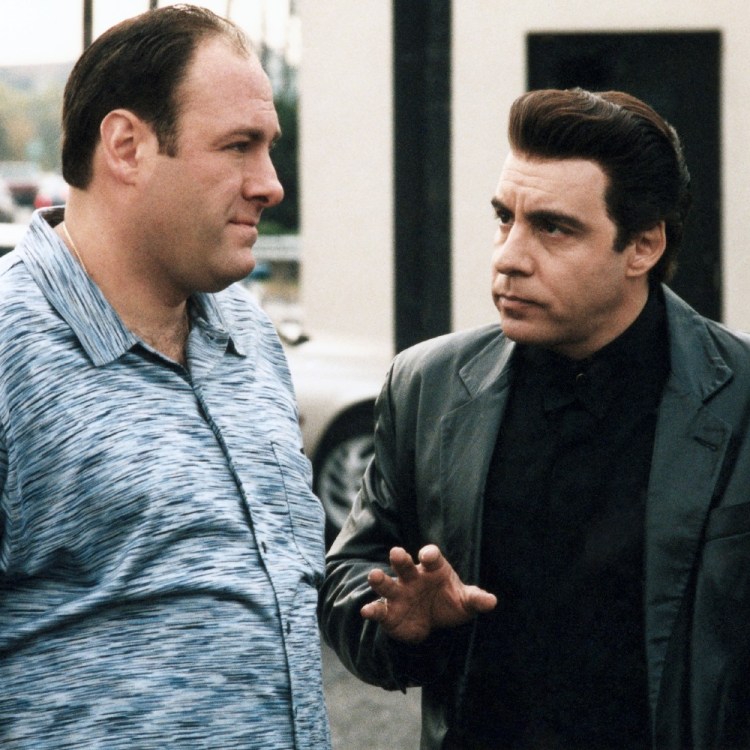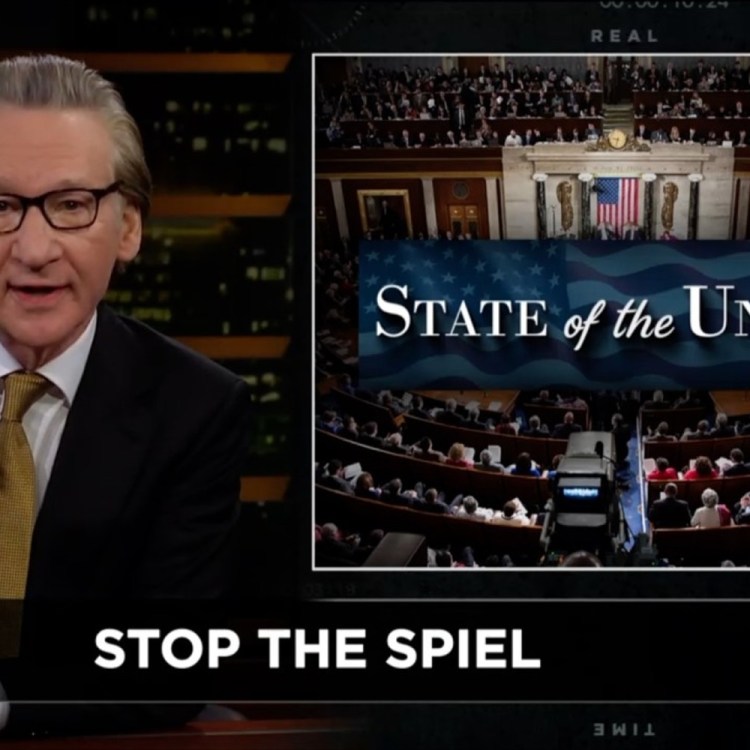“It’s fall! So if you’re fleeing a wildfire this weekend, please take a sweater.” This week’s Real Time With Bill Maher began with a monologue abounding with both distress over the state of the world and exploration of the strange dissonances that accompany it. (This included onetime National Security Advisor Michael Flynn’s citation of a bizarre conspiracy theory about vaccines and salad dressing.)
That we live in a world where a company called Cyber Ninjas recently completed an audit of the Arizona election results is both fertile ground for comedy and terrifying for most rational people. Maher’s remit, as always, is finding some balance between the two. Or, as Maher went on to phrase it: “A fake company hired to do a partisan recount couldn’t come up with a bullshit result.” The punchline, though, went beyond that: turns out Texas’s recount is up next.
Tristan Harris, of the Center for Humane Technology and the podcast Your Undivided Attention, was the first guest of the night. Maher described Harris, a returning guest, as “the guy who keeps it real for us on Big Tech.” In this case, he brought up the Wall Street Journal’s recent series of investigative reports on Facebook. And soon, they’d veered in on one aspect of that reporting: the effect that Facebook’s algorithm has had on political parties.
Harris described the findings as a case of Facebook’s algorithm “rewarding political parties for being more negative.” Negative posts were rewarded; substantive and policy-driven ones were not. “It selects for whoever says the most divisive thing, and then that shoots up to the top,” Harris explained.
Maher brought up Facebook shutting down posts about the “lab origin” theory for COVID-19, which is a subject he’s brought up a few times this season. Neither he nor Harris felt that Facebook should have done this — with Harris pointing out the conflict between the importance of free expression and not wanting more outrageous or harmful statements to circulate.
Harris went on to point out how the pandemic — a time when most people have fewer stimuli than normal — makes people especially vulnerable to “outrage [and] limbic hijacks.” Which explains a lot about the current state of both social media and responses to social media. Will there be an impact from these reports? Harris described them as “a Cambridge Analytica-sized moment,” but wasn’t sure what the full effect might be.
For the evening’s panel, Maher was joined by Jennifer Rubin, author of Resistance: How Women Saved Democracy from Donald Trump, and Richard Ojeda of the organization No Dem Left Behind. After a discussion of the aftermath of the Capitol breach that found Maher wondering why more high-level names haven’t been prosecuted, the trio weighed in on the infrastructure bill currently being debated in Congress and the messaging surrounding it.
Things got meta, in other words. Rubin argued that advocates for the bill haven’t spent enough time emphasizing what’s actually in it, while Maher observed that focusing on the total cost as opposed to its timeframe could lead to incorrect impressions of it. And Ojeda and Maher got into an interesting back-and-forth where Ojeda convinced Maher of the importance of universal Pre-K.
Despite the relative differences in Ojeda, Rubin and Maher’s politics, the three of them were in agreement on many of the topics up for debate. The current standoff in Congress over the debt limit and the state of the labor force led all three to make concurrent observations, with Rubin making a passionate argument against inherited wealth over a certain point.
Finally, the discussion turned to the Biden administration’s foreign policy, which Fareed Zakaria has argued is far closer to that of Donald Trump than many anticipated. Zakaria cited Biden’s policies towards Iran and Cuba, and Maher brought up the administration’s handling of Haitian migrants as well. Rubin disagreed on some points, but did criticize protectionist rhetoric from both Republicans and Democrats.
New Rules closed out the night’s episode. Here, Maher alluded to CBS’s overzealous penchant for FBI-related shows and that headlines like “Intuit Nears Deal to Buy Mailchimp” have left him utterly baffled. (Also, it turns out Maher is not a fan of Christo and Jeanne-Claude’s wrapping of the Arc de Triomphe.)
The bulk of the segment followed up Maher’s comments from a few weeks ago about the NFL adding “Lift Every Voice and Sing” to league games this season. Maher’s argument was, essentially, that the league should play either it or “The Star-Spangled Banner,” but not both. And the first part of the segment found him reiterating this and summarizing the issue to date.
Maher’s objection to multiple national anthems? Citing his “old-school liberal” beliefs, Maher laid out his argument: “Purposefully fragmenting things by race reinforces a terrible message: that we are two nations, hopelessly drifting apart from each other.” For Maher, having multiple national anthems was a case of “separate but equal” — which then led him into a digression about the current state of college campuses.
It was a lot. And, like many a New Rules segment this year, it ended feeling more inconclusive than anything else. There are many people out there who could make the case for playing multiple national anthems before, say, an NFL game; watching this particular segment left me wishing Maher had opted for a conversation on the subject, rather than a monologue.
Thanks for reading InsideHook. Sign up for our daily newsletter and be in the know.


















